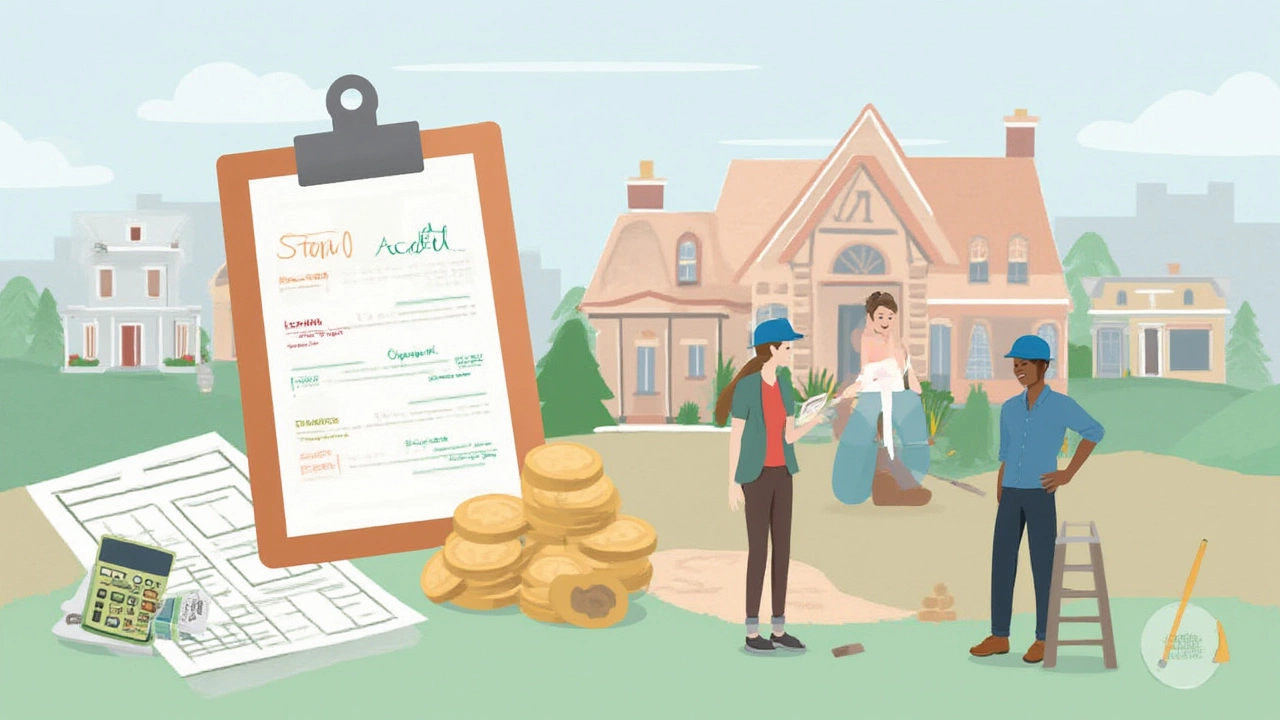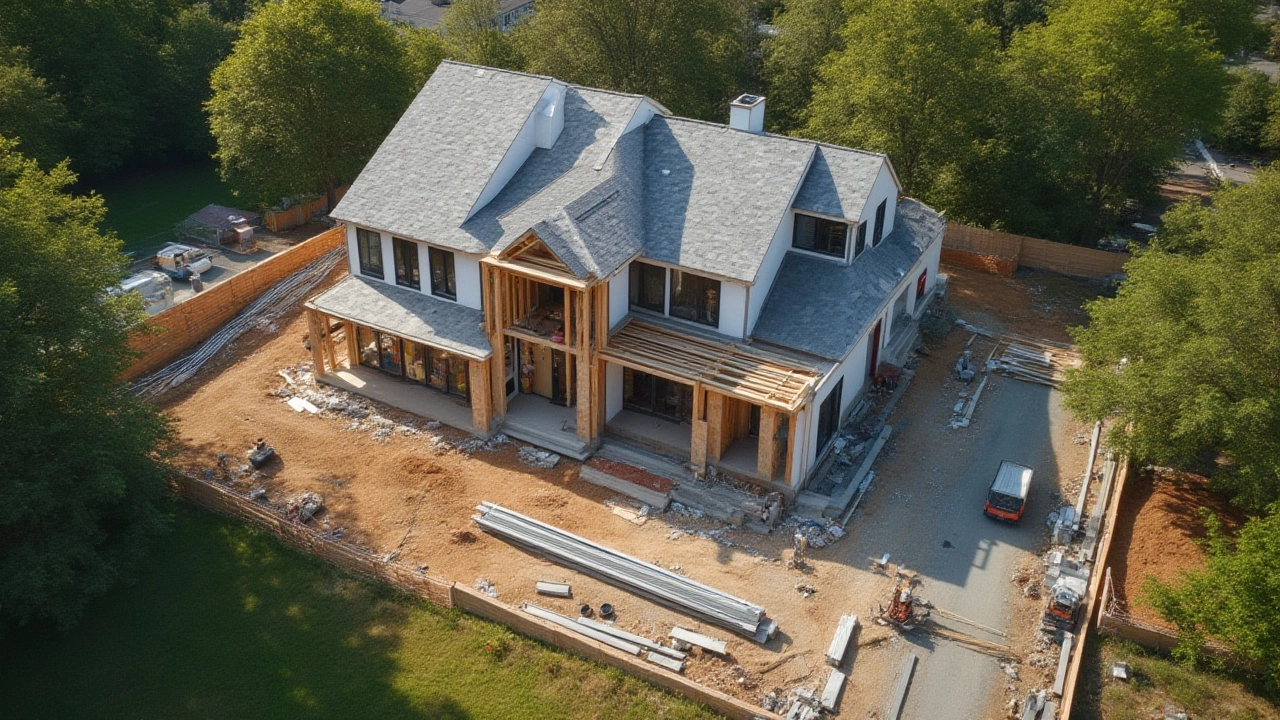Think building a house in Massachusetts is just a matter of signing a few papers and picking out paint swatches? Not even close. The cost to build a 2000 square foot house here has more moving parts than a triple-decker, and it seems like every time you blink, prices have changed. If you’re staring down the idea of settling your family (or maybe just yourself—no judgment) in a brand-new place, you want to know the real dollars and sense. And you’re not alone. Thousands of Bay Staters and would-be transplants are trying to find out exactly what’s hiding behind those price tags. So, what’s it really going to take—money-wise—to lay down roots in Massachusetts with 2000 square feet under your feet?
Breaking Down the Costs: The 2025 Massachusetts Homebuilding Reality
Start typing "cost to build a house in Massachusetts" into any search bar, and you’ll get a jumble of numbers: $200, $400, $600 per square foot. The truth lies somewhere in the middle, but it’s way more complicated than just multiplying your square footage by a single number. We’re looking at an average total build cost in 2025 ranging between $430,000 and $750,000 for a 2000 sq ft house, depending on location, design, materials, and builder. That swings from about $215 up to $375 per square foot. So why the massive gap?
Location is a huge factor. If you want to live in Cambridge, Newton, or anywhere within spitting distance of Boston, you’ll pay top dollar just for the land—even before you pour a single foundation. In the western part of the state, your dollar goes further. But land isn’t the only thing eating up your budget. Let’s look at what actually makes up the cost:
| Cost Component | Estimated Cost (2025, Average) |
|---|---|
| Land Purchase | $80,000 - $250,000 |
| Site Prep & Permits | $25,000 - $45,000 |
| Foundation & Framing | $70,000 - $130,000 |
| Exterior (roof, windows, siding) | $65,000 - $120,000 |
| Plumbing, HVAC, Electrical | $50,000 - $100,000 |
| Interior Finish | $65,000 - $120,000 |
| Builder/General Contractor Fees | $40,000 - $85,000 |
Want to shave off dollars? Go for simpler designs, standard finishes, and keep specialty features to a minimum. But if you dream of heated floors, floor-to-ceiling windows, or imported Italian stone everywhere, brace yourself for the high end of the range.
Land, Permits, and Zoning: The Costs You Don’t See Coming
It’s easy to get caught up in granite countertops and master suite layouts, but in Massachusetts, you’ll spend a lot before you even call the builder. Land can be a wallet-buster, especially east of Worcester. In Middlesex or Essex County, you could be looking at north of $200,000 for a typical building lot. Sometimes that doesn’t even include connecting to utilities—think water, sewer, and electricity—which can eat up an extra $25,000 or more, especially in rural areas.
The hidden maze of permits, inspections, and fees feels endless. Here, each town loves their paperwork. Zoning rules might dictate where you can build, how high you can go, and even if you can use certain colors! Environmental regulations can pile on extra costs, especially if your plot is near wetlands—a common headache in Massachusetts. I remember a neighbor who dropped nearly $10,000 just on a soil test and conservation approval.
The timeline between buying land and slamming your first nail into a board could stretch from a few months to a year. If you’re on a tight schedule, have a sharp-eyed lawyer or realtor comb through everything—one missed covenant or setback law can cost you both time and money. Oh, and don’t ignore taxes. Property taxes in the Bay State aren’t shy; once that certificate of occupancy hits your mailbox, get ready for regular, healthy-sized bills.

How Design Choices (and Market Chaos) Change the Price
Design is where people get themselves in trouble. Every upgrade packs on dollars. Custom plans are beautiful, but hiring an architect in Massachusetts will run you anywhere from $10,000 to $50,000 for a 2000 sq ft home. Want energy-efficient everything? It pays off in the long run, but premium insulation, triple-pane windows, and high-efficiency systems drive up your up-front bill.
And don’t even get me started on the market. Materials like lumber and steel have been on a rollercoaster since COVID, and while prices in 2025 are finally settling, they’re still higher than pre-pandemic. Labor is tricky—Massachusetts has some of the strictest worker safety and wage laws in the country. A skilled tradesperson expects to be paid well, and that’s reflected in every invoice you get from your builder.
Let’s talk features. A basic, two-story colonial will always cost less than a sleek, modern open-concept with complicated rooflines and splashy architectural details. Things like basements (very popular here, thanks to our freeze-thaw cycles) and garages can add $40,000 to $80,000 alone. Outdoor living spaces—porches, screened-in decks, built-in fire pits—those are big here, but each one tags several thousand more onto your tally.
Still, some choices are worth the splurge. Solar panels? Massachusetts offers juicy incentives, and net metering can slash your energy bills for years. Smart home technology is trending everywhere, but especially in new builds here—security, lighting, and HVAC systems you can run from your phone are becoming a "must" rather than a "maybe."
The Cost-to-Own: Beyond the Build
Here’s something first-timers miss: the ongoing bills. Once you’re done building, costs don’t just stop. Massachusetts property taxes average around 1.2% of the home’s assessed value, and for a $700,000 build, you’re out $8,400 every year, give or take. Homeowner’s insurance can reach $2,000 to $3,500 yearly, especially if you’re coastal or in a flood risk area.
Utility hookups can surprise you. Massachusetts winters hit hard, so energy efficiency isn’t just nice to have—it’ll save you serious money. Heating oil and electricity rates are some of the highest in the country, so investing in up-front insulation and modern HVAC can pay for itself pretty quickly. Don’t forget about HOA fees if you’re in a development or planned community—these range from $100 to well over $300 per month just for lawn mowing and snow removal.
Long after move-in day, repairs and maintenance are a real thing. New houses settle—sometimes more than you’d expect—so budget for minor fixes in the first few years. And if you’ve splurged on high-end finishes, keep them clean and sealed, or you’ll eat through your savings replacing hardwoods or bland plaster after a couple winters of salt and slush tracking in.

Tips for Saving on Your Massachusetts Build
Here’s my rapid-fire advice, gathered from a decade of watching folks try to keep their budgets from blowing up:
- Choose a reputable local builder. They know the terrain and have connections to get materials and permits faster.
- Stick to a simple layout and avoid bump-outs, complicated rooflines, or specialty shapes.
- Invest in high-quality doors, windows, and insulation up front—you’ll save loads on your heating bill.
- Don’t skimp on soil tests and site prep—problems here mean chaos later.
- Time your build—spring and early fall often get you better labor availability and sometimes lower bids.
- Limit custom finishes unless you absolutely love them. Stock cabinets, for example, cost way less than having something handcrafted.
- Apply for every rebate and incentive. Massachusetts offers great deals for energy efficiency, solar, and even new-home sprinklers.
- Partner with your neighbors. Bulk-buy fencing or landscaping with folks building nearby to save on materials and labor.
Living in a house you built for yourself—and maybe your Sophia—is a wild feeling. You’ll stress and sweat through endless decisions. But there’s nothing like crossing that threshold and knowing every inch is yours, built the way you want it. In Massachusetts, every foot of heated floor costs something, but with the right planning and a cool head, you’ll end up with a home that lasts as long as the Red Sox curse—which is to say, a pretty darn long time.
